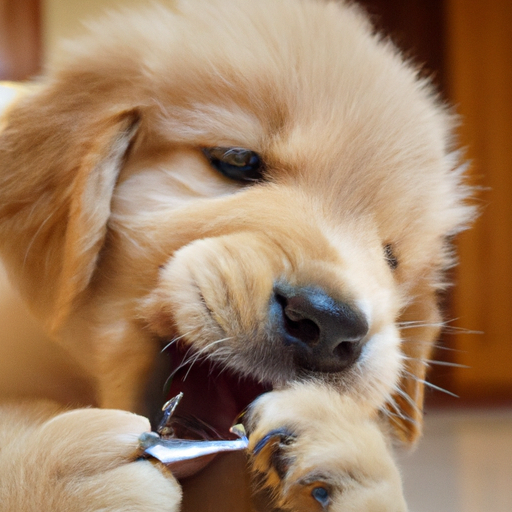You’ve noticed something strange about your puppy. They’re gnawing on everything, drooling more than usual, and there are tiny teeth scattered around your home. Don’t worry, this is all a natural part of puppy development. Let’s dive into the topic of your puppy losing teeth.
1. Understanding Puppy Teething
Just like human babies, puppies go through a teething phase. This is the period when their baby teeth, also known as deciduous teeth, start falling out to make way for the adult teeth. This process usually starts around 12 to 16 weeks of age.
2. Recognizing the Signs of Puppy Teething
There are several signs that indicate your puppy is teething:
- Increased Chewing: Puppies chew to relieve the discomfort of new teeth breaking through the gums.
- Drooling and Dribbling: Excessive drooling is a common sign of teething.
- Bleeding Gums: If you notice a little blood on your puppy’s toys, it’s probably due to teething.
3. How to Help Your Teething Puppy
Here are some tips to help your puppy during this uncomfortable period:
- Provide Chew Toys: Chew toys can help alleviate the discomfort. Look for ones specifically designed for teething puppies.
- Use Cold Items: Frozen carrots or ice cubes can provide relief to sore gums.
- Puppy-Proof Your Home: To protect your belongings (and your puppy’s health), ensure that shoes and other tempting items are out of reach.
4. What to Avoid When Your Puppy is Teething
While it’s important to offer relief to your teething puppy, there are a few things you should avoid:
- Hard Bones and Toys: These can damage your puppy’s new teeth.
- Human Medication: Never give your puppy human pain relief medication as it can be toxic.
- Pulling Loose Teeth: If a tooth is loose, let it fall out naturally to avoid any potential damage.
5. When Will My Puppy Stop Losing Teeth?
Puppies usually have their full set of adult teeth by the time they’re six to seven months old. However, this can vary slightly depending on the breed and individual growth rate.
6. When to See a Vet
While teething is a normal part of puppy growth, there are times when you should seek veterinary care:
- Persistent Baby Teeth: If baby teeth don’t fall out to make way for adult teeth, they may need to be removed by a vet.
- Broken or Cracked Teeth: These can cause pain and infection and should be examined by a vet.
- Changes in Eating Habits: If your puppy refuses to eat or seems in pain when eating, it’s time to see a vet.
7. Puppy Dental Care Tips
Even after your puppy has all their adult teeth, dental care is important. Here are some tips:
- Regular Brushing: Brush your puppy’s teeth regularly with a dog-safe toothpaste.
- Healthy Diet: Provide a diet that promotes dental health.
- Regular Check-ups: Regular vet check-ups include an examination of your dog’s mouth to catch any potential dental issues early.
8. Frequently Asked Questions (FAQs)
Q: How many teeth do puppies lose?
A: Puppies have 28 baby teeth and usually lose all of them to make way for 42 adult teeth.
Q: Is it normal for puppies to swallow their baby teeth?
A: Yes, it’s common and generally not a cause for concern. They usually pass harmlessly through the digestive system.
Q: What should I do if my puppy’s gums are bleeding?
A: A small amount of blood is normal. However, if bleeding is excessive or persistent, consult your vet.
Q: How can I soothe my puppy’s sore gums?
A: Provide chew toys, offer cold items like frozen carrots, and consider products designed to soothe puppy gums.
Remember, while puppy teething can be a challenging time for both of you, it’s a phase that will pass. With your care and patience, your puppy will soon have a healthy set of adult teeth.



